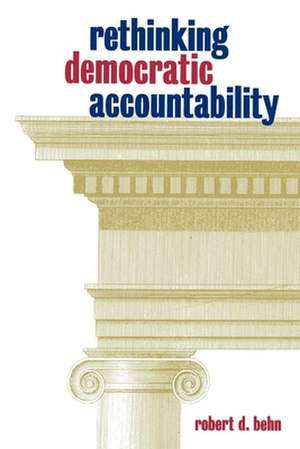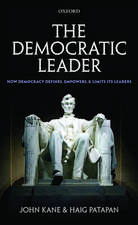Rethinking Democratic Accountability
Autor Robert D. Behnen Limba Engleză Paperback – mar 2001
Traditionally, American government has created detailed, formal procedures to ensure that its agencies and employees are accountable for finances and fairness. Now in the interest of improved performance, we are asking our front-line workers to be more responsive, we are urging our middle managers to be innovative, and we are exhorting our public executives to be entrepreneurial. Yet what is the theory of democratic accountability that empowers public employees to exercise such discretion while still ensuring that we remain a government of laws? How can government be responsive to the needs of individual citizens and still remain accountable to the entire polity? In Rethinking Democratic Accountability, Robert D. Behn examines the ambiguities, contradictions, and inadequacies in our current systems of accountability for finances, fairness, and performance. Weaving wry observations with political theory, Behn suggests a new model of accountability—with "compacts of collective, mutual responsibility"—to address new paradigms for public management.
Preț: 219.63 lei
Nou
Puncte Express: 329
Preț estimativ în valută:
42.03€ • 45.79$ • 35.41£
42.03€ • 45.79$ • 35.41£
Carte tipărită la comandă
Livrare economică 23 aprilie-07 mai
Preluare comenzi: 021 569.72.76
Specificații
ISBN-13: 9780815708612
ISBN-10: 0815708610
Pagini: 328
Ilustrații: black & white illustrations
Dimensiuni: 152 x 229 x 19 mm
Greutate: 0.48 kg
Ediția:New.
Editura: Brookings Institution Press
Colecția Brookings Institution Press
ISBN-10: 0815708610
Pagini: 328
Ilustrații: black & white illustrations
Dimensiuni: 152 x 229 x 19 mm
Greutate: 0.48 kg
Ediția:New.
Editura: Brookings Institution Press
Colecția Brookings Institution Press
Notă biografică
By Robert D. Behn
Descriere
Traditionally, American government has created detailed, formal procedures to ensure that its agencies and employees are accountable for finances and fairness. Now in the interest of improved performance, we are asking our front-line workers to be more responsive, we are urging our middle managers to be innovative, and we are exhorting our public executives to be entrepreneurial. Yet what is the theory of democratic accountability that empowers public employees to exercise such discretion while still ensuring that we remain a government of laws? How can government be responsive to the needs of individual citizens and still remain accountable to the entire polity? In Rethinking Democratic Accountability, Robert D. Behn examines the ambiguities, contradictions, and inadequacies in our current systems of accountability for finances, fairness, and performance. Weaving wry observations with political theory, Behn suggests a new model of accountability—with "compacts of collective, mutual responsibility"—to address new paradigms for public management.















